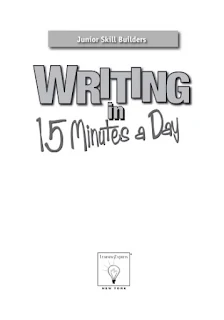 |
| Writing in 15 minutes a day |
DESCRIPTION:
The ability to communicate
effectively through the written word is a vital skill in today's globalized
world. Whether you're a student, a professional, or someone who simply enjoys
expressing themselves through the written word, mastering writing skills in
English grammar is essential. Good writing goes beyond just conveying ideas; it
reflects your clarity of thought, attention to detail, and your credibility. In
this comprehensive guide, we'll explore the key components of writing skills in
English grammar, providing tips and insights to help you become a more
proficient and confident writer.
Section 1: The Fundamentals of
Writing
1.1. Grammar Essentials
Grammar is the foundation of
effective writing. To write well, you need to understand and apply the basic
rules of English grammar. This includes knowing the difference between nouns,
verbs, adjectives, adverbs, prepositions, and conjunctions, and how they
function within sentences.
1.2. Sentence Structure
A well-structured sentence is
the building block of coherent writing. Learn about sentence types (simple,
compound, complex), subject-verb agreement, and sentence clarity. Understand
how to avoid sentence fragments and run-on sentences.
1.3. Punctuation
Punctuation marks, such as
periods, commas, semicolons, and colons, help convey the intended meaning and
tone of your writing. Understanding their correct usage is crucial for precise
and clear writing.
1.4. Spelling
Correct spelling is paramount
in writing. Typos and spelling errors can undermine your credibility. Make use
of spell-checkers and proofreading to catch and correct spelling mistakes.
Section 2: Style and Tone
2.1. Consistency
Consistency is key to creating
a professional and polished piece of writing. Maintain consistency in tense,
point of view, and style throughout your text.
2.2. Clarity
Clarity should be your top
priority. Avoid jargon, overly complex sentences, and unnecessary words. Strive
for simplicity, and ensure your writing is easily understood by your intended
audience.
2.3. Tone
The tone of your writing
should match the purpose and audience. Whether it's formal, informal,
persuasive, or informative, choose the tone that best suits your communication
goals.
2.4. Voice
Develop your unique writing
voice. A strong, distinctive voice can make your writing more engaging and
memorable. Experiment with different styles and find what resonates with you
and your audience.
Section 3: Organization and
Structure
3.1. Introduction
Begin with a compelling
introduction that hooks your readers and outlines the main points of your
writing. A clear introduction sets the stage for what follows.
3.2. Body
The body of your writing
should present your arguments or ideas in a logical and organized manner. Use
paragraphs to break up content and provide structure.
3.3. Transitions
Transitional words and phrases
are bridges that guide your readers through your text. They connect ideas and
make your writing flow smoothly.
3.4. Conclusion
Conclude your writing with a
summary of key points and a closing thought. An effective conclusion leaves a
lasting impression on your readers.
Section 4: Editing and
Proofreading
4.1. Revision
After completing your first
draft, set it aside for a while before revising. During revision, focus on
improving clarity, eliminating redundancy, and refining your writing.
4.2. Peer Review
Consider having someone else
review your work. Fresh eyes can catch errors and provide valuable feedback. A
peer review can also help you gauge the readability of your work.
4.3. Proofreading
Proofreading is the final step
in the writing process. Carefully check for grammar and spelling errors, typos,
and inconsistencies. Pay close attention to details.
Section 5: Building Vocabulary
5.1. Expanding Your Vocabulary
A broad vocabulary allows you
to express yourself more precisely and eloquently. Read regularly and make use
of tools like thesauruses to expand your word choices.
5.2. Word Usage
Understanding the nuances of
word usage is crucial. Avoid using words you don't fully comprehend, and be
mindful of connotations and denotations.
Section 6: Common Pitfalls to
Avoid
6.1. Clichés
Clichés are overused
expressions that can make your writing seem unoriginal. Aim for fresh and
creative ways to convey your ideas.
6.2. Redundancy
Avoid unnecessary repetition
in your writing. If a point has been made, don't belabor it. Brevity is often
more effective.
6.3. Ambiguity
Clarity is essential. Ensure
your writing is unambiguous, and that your readers don't have to guess your
intended meaning.
6.4. Bias and Stereotyping
Avoid bias and stereotyping in
your writing. Treat all subjects and individuals with respect and fairness, and
use inclusive language where appropriate.
Section 7: Tools and Resources
7.1. Writing Software
Consider using writing
software like Microsoft Word or Scrivener, which offer grammar and
spell-checking features. Additionally, there are specialized tools like
Grammarly that can provide real-time suggestions for improvement.
7.2. Style Guides
Consult style guides like The
Chicago Manual of Style, the Associated Press (AP) Stylebook, or The Elements
of Style by Strunk and White to ensure your writing adheres to recognized
standards.
7.3. Grammar Reference Books
Invest in grammar reference
books like "Woe is I" by Patricia T. O'Conner or "The Elements
of Grammar" by Margaret Shertzer to deepen your understanding of grammar
rules.
Conclusion
Mastering writing skills in
English grammar is an ongoing process that requires dedication and practice.
Whether you're a student working on essays, a professional crafting reports, or
simply a passionate writer expressing yourself, these fundamentals will guide
you towards more effective, clear, and engaging writing. With commitment and
effort, you can become a confident and proficient writer who can communicate
your ideas with precision and impact. Writing is not just a skill; it's an art,
and with the right tools and knowledge, you can continually refine and improve
your craft.
